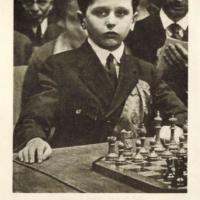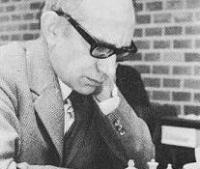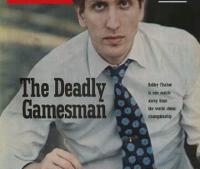
What a Child Prodigy!
Samuel "Sammy" Reshevsky was born November 26, 1911 in Poland. Following the events of World War 1, Reshevsky immigrated to the United States in 1920 where he came into prominence as the most remarkable of all child prodigies! He learned the moves at four by watching his father and at the age of eight he was already at master strength! His first American simultaneous exhibition, at the age of nine, was with 20 officers and cadets at the Military Academy at West Point. He won 19 games and drew one. He toured the country and played over 1,500 games in simultaneous exhibitions and only lost 8 games. He was easily on the level of a Morphy or a Capablanca, but unlike them, he was constantly being exhibited to the public, like Mozart.
This is no way to develop into a well-adjusted human being and fortunately his career as a trained monkey was cut short. It is said that before the age of twelve the boy had never been to school! After 1921 he retired and he went through the normal educational courses, graduating from the University of Chicago in 1933.
After receiving his degree Reshevsky opted for Chess! He captured the United State championship with monotonous regularity between 1936 and 1942; there he had a streak of 75 games without a loss in U.S. Championship competition. In his way he was a killer! From 1936 to 1981 he competed in a record 21 U.S. Championships, and achieved a plus score every time. He also holds U.S. Championship records for most finishes in the top three places (15), most games played (269), and most games won (127). Also he won the U.S. Championship on six occasions the last time being in 1971. Over the course of a long international career he qualified for the Candidates five times and played a record eleven World Champions ranging from Emanuel Lasker to Anatoly Karpov and beating seven of them: Lasker, Jose Raul Capablanca, Alexander Alekhine, Max Euwe, Mikhail Botvinnik, Vasily Smyslov, and Bobby Fischer. Really extraordinary!
After his great victory at Margate 1935, when Reshevsky came in first ahead of Capablanca, whom in addition he defeated in their individual game, and several subsequent successes in international events, such as his shared third place at Nottingham 1936 and his shared first place at Kemeri 1937, Reshevsky received invitations to both AVRO 1938 and the World Championship Tournament ten years later. There he finished in joint third place with Paul Keres, behind Mikhail Botvinnik and Vasily Smyslov.
But the Candidates tournament in Zurich 1953 was probably his best chance to qualify for a World Championship match, where he finished tied for second place with David Bronstein and Keres, two points behind Smyslov. Bronstein, in his last book, “Secret Notes” confirmed that the nine Soviet grandmasters at Zurich were under orders from both their chess leadership and the KGB to not let Reshevsky win the tournament under any circumstances, with Smyslov being the preferred winner.
But Reshevsky never made it to the top, because he was better in matches than tournaments. He won matches against several notable Western players, including Svetozar Gligoric, Miguel Najdorf and Robert James Fischer, after Fischer was forfeited while the match was tied. An inadequate study of the opening and a related tendency to fall into time-pressure may have been the reasons that, despite his great talent, he was never able to become world champion.
Reshevsky was a tough and forceful player who was superb at positional play, but could also play brilliant tactical chess, in many ways comparable to Victor Korchnoi's style.
Reshevsky died in April 4, 1992, in New York, United States.
His arch-rival Reuben Fine said: “Others get tired or excited, rattled, or lose interest, or lose hope; Reshevsky never.”
Gary Kasparov, in volume IV of “My Great Predecessor”, called him the lone warrior; that was Samuel Reshevsky's chess life!
.






